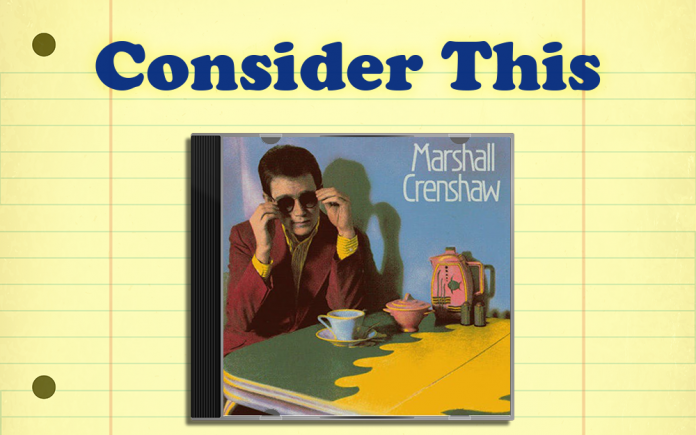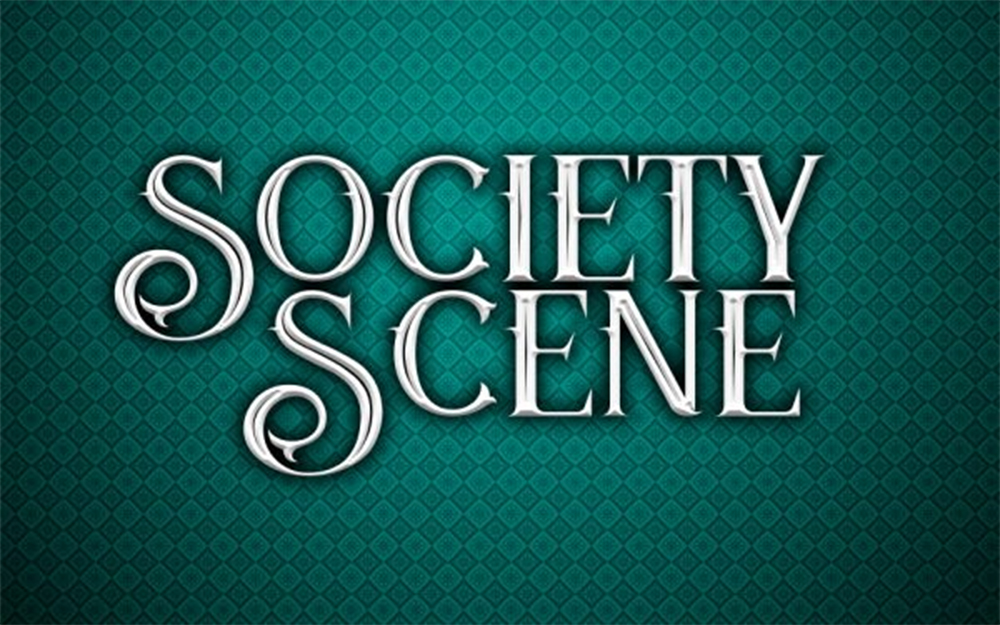
By Eleni P. Austin
Marshall Crenshaw’s music always feels effortless. His self-titled debut arrived 41 years ago and perfectly straddled the line between dayglo New Wave and the primitive cool of ‘50s Rock & Roll.
Marshall had been working toward his debut since he picked up a guitar at age 10. Born in Detroit in 1953, he grew up in the nearby suburb of Berkley. By high school, he had cycled through a series of bands. A few years out of school, he’d developed an antipathy for generic Top 40 fare, which he characterized as narrow and white-washed. He turned his attention to music released in the ‘50s and early ‘60s. He was equally enamored with primitive Rock & Roll and romantic R&B. Each style informed his own songs.
Bored with the Detroit music scene, opportunity knocked in the form of a Rolling Stone ad that offered open auditions for the Broadway production Beatlemania. Winning the role of John Lennon, Marshall endured several months of “Beatle Bootcamp.” Extended runs in San Francisco and Los Angeles, plus several months on the road, provided invaluable experience. It also motivated him to quit the production and actively pursue his own music career.
Armed with a clutch of original demos, he relocated to New York City. He enlisted his younger brother, Robert to play drums. He auditioned about 30 bassists before he found Chris Donato.
Marshall literally walked the city streets, dropping off his demo tape to various show biz movers and shakers. Music journalist/record label owner, Alan Betrock was one lucky recipient. He immediately recognized Marshall’s protean talent and released his first official single, “Something’s Going To Happen” on his Shake Records label. It created a buzz and he secured a deal with Warner Brothers Records.
Although he wanted to produce his debut himself, Marshall got bogged down in the minutiae of the recording process. The label Richard Gotterher to step in. The veteran producer was already riding high from his work on The Go-Go’s debut, Beauty And The Beat, which climbed the charts and perched at #1 for six weeks. The first “Girl Group” to accomplish that feat.
Gotterhrer streamlined Marshall’s sound and his self-titled debut arrived in the Spring of 1982. Critical acclaim was instant and unanimous. The record spent six months on the Billboard Hot 100, peaking at 50. For the rest of the ‘80s, he released a string of excellent albums including Field Day, Downtown, Mary Jean & 9 Others and Good Evening. Although they all earned great reviews, and his loyal and enthusiastic fan base continued to grow, commercial success eluded him. During that decade, his profile was raised exponentially when he was cast in a couple of hit movies, Francis Ford Coppola’s Peggy Sue Got Married and La Bamba where he portrayed his doppelganger, Buddy Holly.
Throughout the years, he has continued to make stellar records. Life’s Too Short, Miracle Of Science, #447 and a live effort, My Truck Is My Home arrived in the ‘90s. The 21st century saw the release of What’s In The Bag, Jaggedland and #392. He also managed to produce a compilation for Capitol Records: Hillbilly Music…Thank God, Vol. 1, he wrote a book, Hollywood Rock: A Guide To Rock & Roll In The Movies. He appeared in the Nickelodeon series The Adventures Of Pete & Pete, co-wrote the Gin Blossoms’ “Til I Hear It From You,” which reached #4 on the Billboard charts. He also co-wrote a song for the hilarious music bio-pic parody film, Walk Hard and hosted a weekly radio show, Bottomless Pit for WFUV. Along the way, a plethora of disparate artists like Bette Midler, Lou Ann Barton, Marti Jones, Kelly Willis and Ronnie Spector began covering his songs. These days, he’s been logging a lot of miles on the road. headlining his own gigs and touring with the Smithereens, subbing on lead vocals for the late, great Pat DiNizio. Recently, he was able to reclaim the U.S. rights to the five stellar albums he recorded on Warner Brothers between 1982 and 1989. YepRoc Records released a 40th anniversary vinyl edition of the self-titled debut on the most recent Record Store Day. Now it’s finally available on other formats.
The original 12-song set kicks into gear with “There She Goes Again.” The sanguine and self-assured melody and arrangement, accented by jaunty guitars, ambling bass lines and a chunky beat, belie a tale of lost love and betrayal. Marshall’s reedy tenor wraps around lyrics that focus on heartbreak and sweet revenge; “She was my girl, not so long ago, how I lost her, I’m not sure I know, but it makes no difference how I try, there she goes again with another guy.” By the bridge he’s ready for some romantic retaliation; “It’s a sad situation, but I know just what I ought to do, I’m gonna find someone better, go have fun little girl, I can live without you.”
If this record has a leitmotif, it’s the pursuit of the opposite sex. “Mary Anne,” blends chiming guitars, tensile bass and a tumbling backbeat. Lyrics offer up an awkward attempt at consoling someone who seems oblivious to his amorous intentions; “It isn’t such a crime, it isn’t such a shame, it happens all the time, you shouldn’t take the blame, go on and have a laugh, go have a laugh on me, go on and have a laugh at all your misery/Mary Anne, Mary Anne, I really want to tell you Mary Anne, I’m really thinking of you, Mary Anne, Mary Anne, Mary Anne.” A spiky guitar solo on the break amps up the lovelorn urgency, but his ardor remains unrequited.
“Girls” simply sends out an S.O.S. to anyone with a couple of X chromosomes. Soulful vocals lattice walking bass lines, percolating percussion, nimble guitar licks and a thunking beat. Lady-lovin’ lyrics are completely besotted by a parade of feminine pulchritude; “I fall in love from my head to my feet, when I’m watchin’ all those girls walkin’ down the street, they go to my head like red wine, you know I feel fine, cause all I ever have in my mind is girls, girls, girls.” A stinging guitar solo on the break is equally single-minded, brushing up against stacked harmonies on the final refrain.
Meanwhile, “She Can’t Dance” is a pragmatic shout-out to a Rock & Roll femme fatale. Sinewy guitars and angular bass are wed to a caffeinated beat. Lyrics offer a gimlet-eyed homage to an um, enthusiast; “Well now baby’s only trying to lose all of her blues, down in her heart cause she’s only 17, and she means to cause a scene/She can’t dance, she can’t sing, but she’s got to be part of that bang-bang-head-bang music, she’s glued to the radio, every night and day, I can hear her say ‘let’s go, let’s go, let’s go, let’s go, let’s go.” Marshall rips a surprisingly muscular guitar solo that squiggles and spirals through the break with a brash nonchalance.
Finally, on “I’ll Do Anything For You,” is fueled by ricocheting guitars, boomerang bass and a rock-steady beat. Marshall wears his heart on his sleeve; “I’ll play the fool resignedly, if it’s what I have do, cause you mean a lot to me, I’ll do anything for you.” Corkscrew guitars charge through the break mirroring moments of equivocation; “But let’s not talk about it, we got better things to do, unless you want to talk about it, I’ll do anything for you.” Clearly he’s ready to bare his heart, but not his soul.
Two tracks, “Someday, Someway” and “Cynical Girl” each exhibited across-the-board appeal, garnering airplay on Top 40 radio, New Wave stations like KROQ, 91x and WLIR, even landing on the playlists of AOR stalwarts like KMET, KLOS and WNEW. The former is powered by shang-a-lang guitars, roiling bass, infectious handclaps and a hopscotch beat. Marshall’s angsty delivery contradicts lyrics that pledge allegiance, noting, “You’ve taken everything from me, I’ve taken everything from you, I’ll love you for my whole life through.” Hooky and irresistible, this elastic little rocker has truly stood the test of time.
The latter is slightly more sardonic. In the late ‘60s, Neil Young wanted to live with a “Cinnamon Girl,” by the blasé ‘80s, Marshall’s qualifications are less exotic. Sitar-iffic guitars partner with Spector-esque glockenspiel, tingly bass lines and a four-on-the-floor beat. Long before we could swipe right for a perfect dream-date on Tinder, Marshall’s got his specifications all mapped out; “Well, I hate TV, there’s gotta be somebody else than me who’s ready to write it off immediately, I’m looking for a cynical girl, well, I’ll know right away by that look in her eye, she harbors no illusions and she’s worldly-wise/And I know, when I give her a listen, that she, she’s what I’ve been missin, what I’ve been missin.” A ringing guitar solo on the break, underscores his playful mien.
Back-to-back tracks echo the stripped-down, lean and unfussy music made by early Rock & Roll progenitors like Elvis Presley, Rick Nelson and, yes, Buddy Holly. “Rockin’ Around In NYC” is a rollicking rave-up that matches restless, erudite lyrics to a wildly irresistible melody and arrangement. Reverb-drenched guitar connects with slapdash bass and a pounding triple-time tattoo. Marshall explains his dilemma; “Whenever idleness is making me insane, well, then I feel I should be getting the train on the double, here comes trouble…whenever ennui is taking me way down, well then I feel I should be getting’ to town on the double, well, here comes trouble/So round and round and round we go, through 17 lights in a row, take a hold of my hand and come with me, we’ll go rockin’ around in NYC.”
On “The Usual Thing,” rambunctious guitars ride roughshod over thrumming bass lines tethered to a galloping gait. Devil-may-care lyrics caution a prospective partner; “I wanna take you with me, I’ll do most anything you want me to, when we go out together, we must run wild, but first I’m warning you/Don’t want to know about the usual thing, I never bother with the usual thing, and I only want to shout, want to shout, want to feel alive, do whatever I wanna do, just forget about the usual thing, I never bother with the usual thing, and if I didn’t think you were a little bit out there too, I just wouldn’t bother with you, I just wouldn’t bother with you.” On the break he uncoils a lithe and sparkly solo that somersaults through the arrangement, sticking the landing perfectly.
Other interesting tracks include a souped-up rendition of Arthur Alexander’s Doo-Wop groover, “Soldier Of Love” and the driving “Not For Me.” The original album closed with the snap, crackle and fizz of “Brand New Lover.” Marshall’s exuberant vocals are buoyed shimmying guitars, boinging bass and a walloping backbeat. Despite downcast lyrics like “I’m feeling dazed and dissipated, I only know one thing for sure, gotta find me a brand new lover, there isn’t any other cure,” the mood here is positively giddy. Sidewinder guitar snakes through the arrangement on the break, signaling he’s young, single and ready to mingle. An effervescent end to a dazzling debut.
Except, YepRoc has tacked on seven additional songs including a live version of The Parliaments’ “Look What I Almost Missed,” alternate versions of “Brand New Lover” and “Just Not For Me (a.k.a. Not For Me). There are the two songs that started his career, “Something’s Gonna Happen” and “(You’re My Favorite) Waste Of Time” The previously unreleased “Never Gonna Happen Again” and a yearning demo version of “Mary Anne.”
40 years on, this record hasn’t aged a bit. It still feels timeless. Catchy and concise, with hints of Power Pop, Rockabilly, Country Western, Soul and good old Rock & Roll. Hopefully, Marshall has some new music in the pipeline. But until then, there’s this.












































